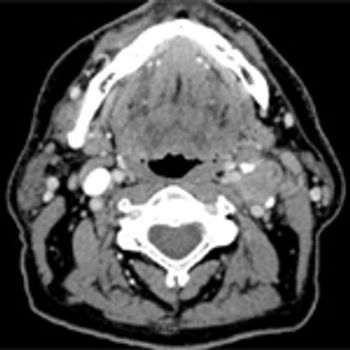
A Washington University School of Medicine team’s findings might inform future research into inhibitors of angiogenesis and PD-1 in head and neck cancer.

Your AI-Trained Oncology Knowledge Connection!


A Washington University School of Medicine team’s findings might inform future research into inhibitors of angiogenesis and PD-1 in head and neck cancer.

A California study showed women are significantly undertreated for head and neck cancer, with several factors possibly accounting for the disparity.

In a CYCORE trial, mobile technology improved patient tracking, enabling clinicians to detect concerning symptoms early and respond quicker.

AZD1775, a small-molecule, WEE1-targeting TKI, significantly shrunk tumors when administered in combination with cisplatin and docetaxel in a phase I trial.

A phase II trial found that the immune checkpoint inhibitor durvalumab has promising clinical activity and is well tolerated both as monotherapy and in combination with tremelimumab in patients with heavily pretreated recurrent or metastatic head and neck cancer, whose tumors are PD-L1 low or negative.

An early phase trial found that it is feasible to combine nivolumab immunotherapy with radiation therapy and chemotherapy in patients with newly diagnosed local-regionally advanced head and neck cancers.

Patients with human papillomavirus–associated head and neck cancers who respond well to induction therapy can receive substantially lower doses of radiation and still achieve good safety and efficacy outcomes, according to a new phase II trial.

Patients with head and neck cancer who had depressive symptoms at the time of treatment planning had worse overall 2-year mortality.

Researchers have identified mutations that may help distinguish which laryngeal cancer patients could benefit from therapy, since the disease is notoriously resistant to chemotherapeutic treatments.

The staging of oropharyngeal squamous cell carcinoma has undergone key changes in the eighth edition of the American Joint Committee on Cancer Staging Manual, set to take effect January 1, 2018. We describe the revised staging parameters and the rationale in support of the changes.

Results from a study of patients with newly diagnosed head and neck cancer indicate that cognitive screening should be incorporated into pretreatment assessment for patients in order to improve outcomes.

Researchers found a statistically significant difference in median survival time between smokers and nonsmokers at diagnosis of head and neck squamous cell carcinoma.

In this interview we discuss a retrospective study that looked at survival outcomes in HPV-positive oropharyngeal cancer patients treated with either definitive chemoradiation therapy or primary surgery.

This video highlights an education session on the challenge of perineural invasion in head and neck cancer from the 2017 ASTRO Annual Meeting.

Use of a single-day multidisciplinary clinic visit allowed for more efficient and comprehensive cancer care in a group of patients with head and neck cancer, according to the results of a new study.

This video examines results of a study that looked at treatment tolerability in elderly patients with HPV-positive oropharyngeal squamous cell carcinoma.

This video highlights 2-year results of a phase II study evaluating aggressive adjuvant chemoradiation dose de-escalation in HPV-positive oropharynx squamous cell carcinoma.

Use of unilateral intensity-modulated radiotherapy reduced acute toxicities and maintained oncologic outcomes compared with bilateral IMRT in patients with lateralized palatine tonsillar cancer, according to the results of a new study.

FDG-PET/CT surveillance using a standardized reporting criteria 12 weeks after concurrent chemoradiotherapy was reliable in patients with locoregionally advanced head and neck squamous cell carcinoma, except in patients with late manifesting residual disease, according to the results of the ECLYPS study.

This video highlights studies on HPV-positive head and neck cancer presented at the 2017 ASTRO Annual Meeting.

In this interview we discuss new clinical guidelines from ASTRO on the use of radiotherapy in treating oropharyngeal cancer.

Chemoprevention with low-dose 13-Cis retinoic acid, a synthetic vitamin A derivative, did not lower the incidence of second primary tumors in patients with squamous cell cancer of the head and neck.

The addition of high-intensity primary tumor ablation in addition to systemic chemotherapy may improve the survival of patients with metastatic head and neck squamous cell carcinoma.

Adherence to each of five quality metrics for head and neck squamous cell carcinoma was associated with a reduced risk for death.

Higher nodal yield during definitive surgery for clinically node-negative oral cavity squamous cell carcinoma was associated with improved mortality.